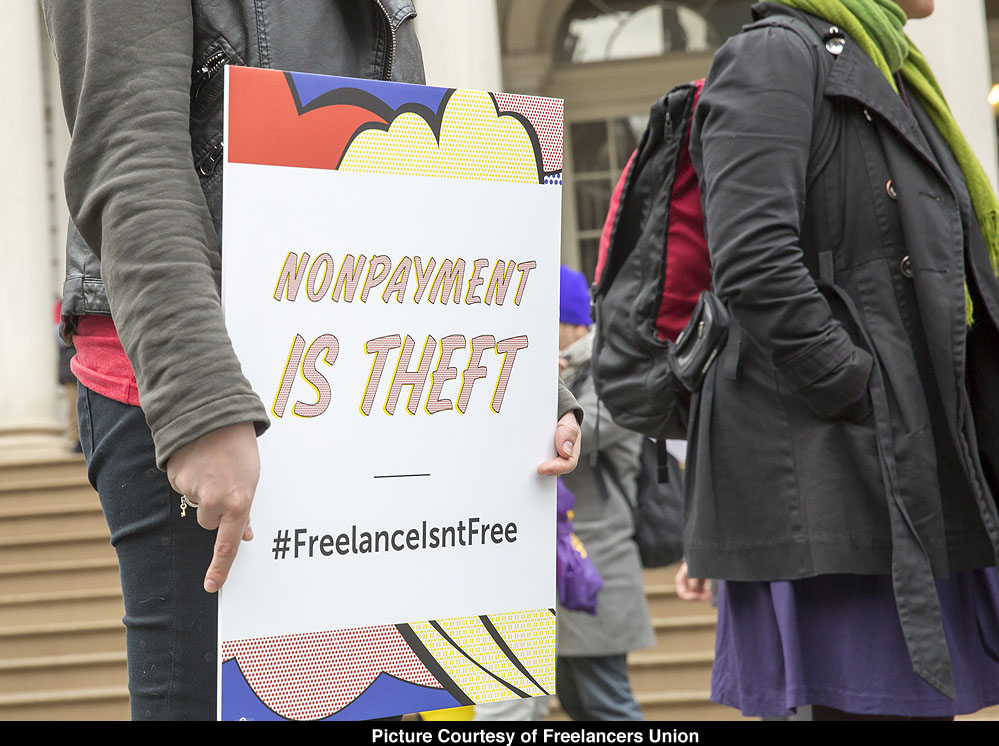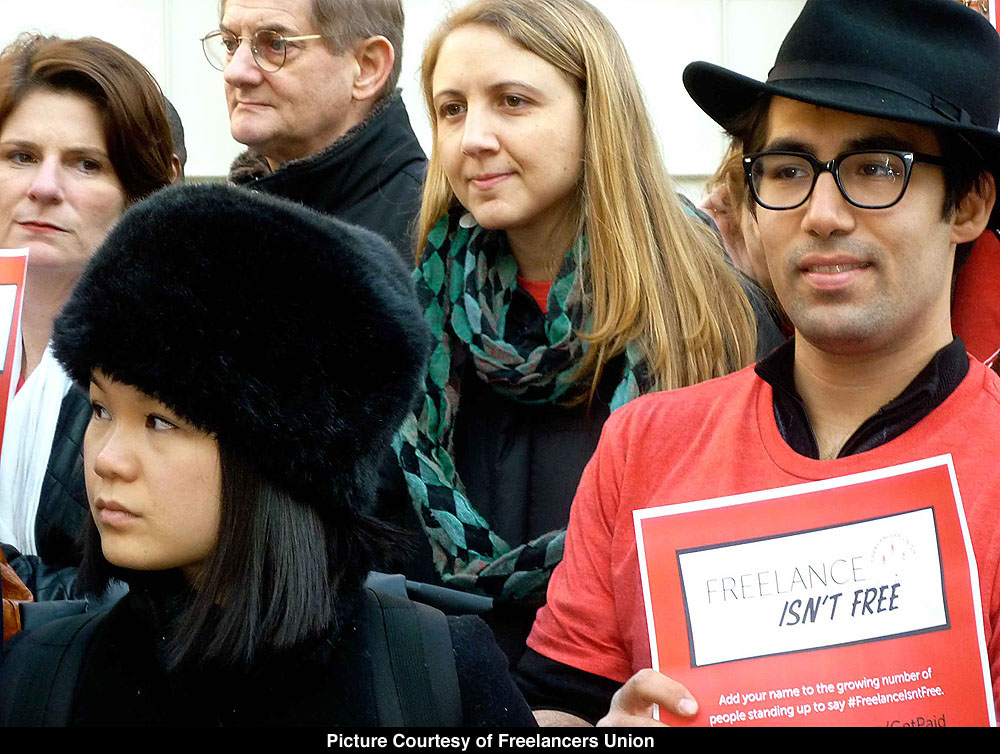By Senior Editor Jimmy Kelly, March 26, 2016
Deborah Cowell, a veteran book editor and freelance writer of more than 10 years, negotiated a $500 agreement with a client to do editorial work. When the project was complete, however, the client altered Cowell’s work, claimed all of her intellectual property as its own and refused to pay the agreed upon $500. After three months of vigorous pursuit, Cowell was eventually given $60 in cash and was told “take it or leave it.”
Cowell never received the balance of $440, she said in her appearance before a New York City Council committee holding a public hearing on a pending bill known as the Freelance Isn’t Free Act. If the bill becomes law, the legislation can help protect freelancers from being ripped off, Cowell told the committee.
“Freelance Isn’t Free Act.”

Lucy Reading-Ikkanda, a freelance designer and illustrator for 12 years, also told the committee about her costly experience. Hired by a client to work for a magazine, she was covering for an employee who was on extended maternity leave. Reading-Ikkanda signed a contract with for a 30-day payment cycle. However, after submitting her first invoice, the accounts department of the magazine informed her that the company had a 75-day payment cycle.Reading-Ikkanda waited the allotted 75 days, but still did not receive payment.
After the maternity leave arrangement was complete, Reading-Ikkanda still had not receive any payment. The total of her submitted invoices had reached $17,500. In the meantime, Reading-Ikkanda had to pay rent, taxes, and health insurance. She spent many hours sending emails and phoning the company. Reading-Ikkanda eventually received a paycheck after six months, but the “Freelance Isn’t Free Act,” if passed, can help freelancers be paid more timely, she said at the City Hall meeting.
Jon Harper, a freelancer in the theater industry for nine years, made an agreement with a puppet company to help produce their show and have it ready for opening night. Harper spent “every bit of free time” he had with them until the show was ready about a week later, he said at the public hearing. He invoiced the company for his time and that came out to “a little over a thousand dollars,” he said. The show Harper helped to produce ran for over a month, yet, he never received a check.
Performers in the play had only been paid half their balance, and even some of those checks had bounced. After four months of waiting, and several broken promises of the check is in the mail, Harper was still waiting at the time of his appearance before the committee.
There are nearly 54 million freelance workers in the United States and many face similar issues of nonpayment and late payment that Cowell, Reading-Ikkanda, and Harper experienced, according to, The Costs of Nonpayment: a study of nonpayment and late payments in the freelance workforce, representatives of the National Employment Law Project.
New York City has 1.3 million freelance workers, according to the Freelancers Union, and, according to its estimates, “More than seventy percent of freelancers experience late or nonpayment at some point in their career, getting stiffed an average of $5,968 every year.” While employees of companies are protected against wage theft by the State Department of Labor, freelance workers can only sue or walk away. “Increasingly, that’s a gamble companies with lawyers and resources at their disposal are willing to make,” according to the NELP report.
Surviving in New York Can Be “Nearly Impossible” for Freelancers
A committee of the City Council held the public hearing Monday, February 29, on the “Freelance Isn’t Free Act.” According to The Committee on Consumer Affairs’ Report of The Governmental Affairs Division, the bill will be “a local law designed to amend the New York City Charter and the Administrative Code, in relation to establishing protections for freelance workers.” If passed, it would be the first law in the country to protect freelance workers.
Freelance workers make up one-third of the workforce in the United States. A survey of 5,358 freelance workers across the country, carried out by the Freelancers Union in July 2015, reported that half of the workers faced difficulty collecting payment for their work in 2014. Seventy-one percent had trouble with receiving payment at some point in their careers.
While eighty one percent of these workers said that there were times when they were paid late, thirty four percent said they were not paid at all. One question in the survey asked for the longest time a freelance worker had to wait for payment. The average answer was 98 days or over three months.
The city legislation could protect freelancers from nonpayment and late payment by requiring most freelance work “valued at over $200” to be done under a written contract that details key terms and a payment deadline. Contracts must stipulate that the clients pay as agreed to in the contract in no later than 30 days after the contract deadline. As a result “any violation of these provisions would give rise to private cause of action in which the prevailing freelancers would collect double damages and attorney’s fees,” according to the bill.
In addition, the bill would create a procedure for the Department of Consumer Affairs to assess civil penalties for a client. Sara Horowitz, founder and executive director of the Freelancers Union, said in her testimony that freelance workers are “truly the backbone of New York City’s economy.” Yet, Horowitz also said, “Too many freelancers aren’t getting paid for the work that they do.” She cited a statistic that the average unpaid freelancer loses nearly $6,000 a year.
“For our members,” said Horowitz,” this represents about 13 percent of their annual income.” Due to the income instability caused by late or nonpayment, many freelancers face difficulty paying rent, health insurance, and tax payments. “But loss of income doesn’t just stop there,” Horowitz said, “it stifles business growth, incurs debt, and makes surviving in New York City nearly impossible.”
Horowitz listed the benefits and effects of the Freelance Isn’t Free bill. By mandating written contracts, she said, the bill will help both freelancers and clients set clear expectations from the beginning and mitigate possibility of conflicts. The bill will also establish 30-day payment terms so that workers are paid on time. Finally, the bill will formalize and increase penalties for nonpayment which will ultimately, according to Horowitz, “dissuade unethical business practices.”

The bill is designed to protect freelance workers like Latefa Harmon, a professional development consultant, from breach of contract with big businesses that either pay months late or do not pay at all. Harmon told the committee that since she began working as a freelancer in 2008, she “consistently had a variety of different issues with nonpayment.” Harmon gave a specific example of one deadbeat business, which she could not name because of her contract. Harmon said that in 2015 this client hired her “for a package of training and development services to improve their business performance.”
In order to secure the job, she said, she “offered them a discount flat-rate of $10,000.” After signing a written contract, the client paid a stipulated retainer and deposit of $2,700 upfront and then later paid a subsequent installment of $2,300 “just before the completion of the project,” she said.
However, Harmon said, even though her work was always approved, the client “refused to pay the balance of $5,000 at the end of the project—after three months of work completed.” She tried several times to collect the balance but was rebuffed. Nonetheless, she said, the client had “implemented my strategy and their business is profiting from my work.”
Harmon said that she only pursued projects “with large companies and agencies who can easily afford to pay their contractors.” However, even these larger corporations “can sometimes take up to 6 months to produce a check.”
Harmon said that companies would make hard deals with freelancers because they know that freelancers do not have any legal protection. At the time of Harmon’s testimony, she said the penalties for not paying a freelancer “only lie within the realm of an actual lawsuit.” However, many freelancers often do not pursue this option because, Harmon said, “if we aren’t getting paid, and can barely pay our own bills, how can we afford to take someone to court?”
Harmon said that freelance workers are becoming common in a modernized workforce and that freelancers provide one-of-a-kind services to “companies of all sizes.” If city council were to pass the Freelance isn’t Free Act, Harmon said, the bill “will allow us the needed protections for our work.”
Christopher Maue’s Account of Surviving In New York City
Christopher Maue, a video editor and motion graphics animator, also shared a story of nonpayment from a client. Maue moved to New York City in 2011 because, he said, “this is the center” of his industry. However, since he moved here, “Every year I’ve had to face a non-payment of some significant amount of money,” he said. Maue said that he began this year with “over $10,000 worth of outstanding payments” from two clients. He was finally able to receive a payment of $8,000 from one only after “repeatedly refusing to complete further work until payment was made.”
Maue was not paid in full until three months after the end of the payment term. “Going for three months without receiving my expected payment put me in a terrible financial position,” said Maue.
“The Freelance Isn’t Free Act has the potential to enact major change for freelancers,” Maue said. By mandating contracts, the law would make clients stick to their payment amounts and timelines, and “clients will not be able to treat those promises as negotiable after the work has been completed.” Because of the law, the common issues of late, short, or nonpayment could be reported to proper authorities and deadbeat clients could be faced with penalties.
Manhattan Borough President, Gale Brewer, a Democrat, told the committee that the Freelance Isn’t Free Act was a pragmatic approach to remedy the issues many independent contractors face, such as the “frequently time-consuming and costly experience of pushing unresponsive clients to fulfill their obligations to pay for services rendered.” Brewer said that the legislation couldn’t have been taking place at a better time because “an increasing percentage of Americans prefer” to hire independent contractors.
Brewer said that “some economists expect this sector to grow by fifty percent by 2020.” Her own experience with independent contractors, she said, has taught her “how difficult it is for these entrepreneurs to find stability and thrive.” As a City Council member, Brewer said that she supported legislation and regulations “that made possible a new kind of economy where workers can have more flexibility and creative freedom.”
She also said that this economy should also have laws to “ensure that workers are not exploited” and allow freelancers to “enjoy the same protections as traditional employees.”
– Senior Editor James Kelly can be reached at James.kelly41@myhunter.cuny.edu
